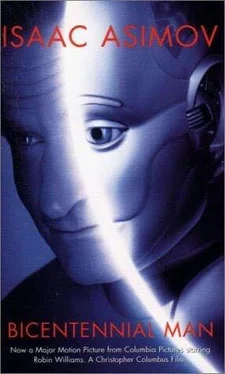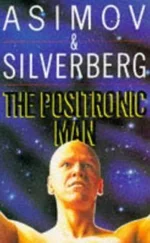Isaac Asimov - The Bicentennial Man and Other Stories
Здесь есть возможность читать онлайн «Isaac Asimov - The Bicentennial Man and Other Stories» весь текст электронной книги совершенно бесплатно (целиком полную версию без сокращений). В некоторых случаях можно слушать аудио, скачать через торрент в формате fb2 и присутствует краткое содержание. Год выпуска: 1976, ISBN: 1976, Издательство: Doubleday science fiction, Жанр: Фантастика и фэнтези, на английском языке. Описание произведения, (предисловие) а так же отзывы посетителей доступны на портале библиотеки ЛибКат.
- Название:The Bicentennial Man and Other Stories
- Автор:
- Издательство:Doubleday science fiction
- Жанр:
- Год:1976
- ISBN:ISBN: 0-385-12198-9
- Рейтинг книги:4 / 5. Голосов: 1
-
Избранное:Добавить в избранное
- Отзывы:
-
Ваша оценка:
- 80
- 1
- 2
- 3
- 4
- 5
The Bicentennial Man and Other Stories: краткое содержание, описание и аннотация
Предлагаем к чтению аннотацию, описание, краткое содержание или предисловие (зависит от того, что написал сам автор книги «The Bicentennial Man and Other Stories»). Если вы не нашли необходимую информацию о книге — напишите в комментариях, мы постараемся отыскать её.
The Bicentennial Man and Other Stories — читать онлайн бесплатно полную книгу (весь текст) целиком
Ниже представлен текст книги, разбитый по страницам. Система сохранения места последней прочитанной страницы, позволяет с удобством читать онлайн бесплатно книгу «The Bicentennial Man and Other Stories», без необходимости каждый раз заново искать на чём Вы остановились. Поставьте закладку, и сможете в любой момент перейти на страницу, на которой закончили чтение.
Интервал:
Закладка:
“Why should they be? They are grown, with lives of their own.”
“Are they invited? Is the President interested in seeing them? You’re his private secretary. You would know. Are they?”
Janek said, “You’re wasting time. A robot can’t kill a human being. You know that that is the First Law of Robotics.”
“I know it. But no one is saying that the robot-Winkler killed the human-Winkler directly. When the human-Winkler was in the crowd, the robot-Winkler was on the stand and I doubt that a disintegrator could be aimed from that distance without doing more widespread damage. Maybe it could, but more likely the robot-Winkler had an accomplice—a hit man, if that is the correct Twentieth-Century jargon.”
Janek frowned. His plump face puckered and looked pained. He said, “You know, madness must be catching. I’m actually beginning to consider the insane notion you’ve brought here. Fortunately, it doesn’t hold water. After all, why would an assassination of the human-Winkler be arranged in public? All the arguments against destroying the robot in public hold against the killing of a human President in public. Don’t you see that ruins the whole theory?”
“It does not—” began Edwards. “It does. No one except for a few officials knew that the mechanical device existed at all. If President Winkler were killed privately and his body disposed of, the robot could easily take over without suspicion—without having roused yours, for instance.”
“There would always be a few officials who would know, Mr. Janek. The assassinations would have to broaden.” Edwards leaned forward earnestly. “See here, ordinarily there couldn’t have been any danger of confusing the human being and the machine. I imagine the robot wasn’t in constant use, but was pulled out only for specific purposes, and there would always be key individuals, perhaps quite a number of them, who would know where the President was and what he was doing. If that were so, the assassination would have to be carried out at a time when those officials actually thought the President was really the robot.”
“I don’t follow you.”
“See here. One of the robot’s tasks was to shake hands with the crowd; press the flesh. When this was taking place, the officials in the know would be perfectly aware that the hand shaker was, in truth, the robot.”
“Exactly. You’re making sense now. It was the robot.”
“Except that it was the Tercentenary, and except that President Winkler could not resist. I suppose it would be more than human to expect a President—particularly an empty crowd pleaser and applause hunter like Winkler—to give up the adulation of the crowd on this day of all days, and let it go to a machine. And perhaps the robot carefully nurtured this impulse so that on this one Tercentenary day, the President would have ordered the robot to remain behind the podium, while he himself went out to shake hands and to be cheered.”
“Secretly?”
“Of course secretly. If the President had told anyone in the Service, or any of his aides, or you, would he have been allowed to do it? The official attitude concerning the possibility of assassination has been practically a disease since the events of the late Twentieth Century. So with the encouragement of an obviously clever robot—”
“You assume the robot to be clever because you assume he is now serving as President. That is circular reasoning. If he is not President, there is no reason to think he is clever, or that he were capable of working out this plot. Besides, what motive could possibly drive a robot to plot an assassination? Even if it didn’t kill the President directly, the taking of a human life indirectly is also forbidden by the First Law, which states: ‘A robot may not injure a human being or, through inaction, allow a human being to come to harm.’ ”
Edwards said, “The First Law is not absolute. What if harming a human being saves the lives of two others, or three others, or even three billion others? The robot may have thought that saving the Federation took precedence over the saving of one life. It was no ordinary robot, after all. It was designed to duplicate the properties of the President closely enough to deceive anyone. Suppose it had the understanding of President Winkler, without his weaknesses, and suppose it knew that it could save the Federation where the President could not.”
“You can reason so, but how do you know a mechanical device would?”
“It is the only way to explain what happened.”
“I think it is a paranoid fantasy.”
Edwards said, “Then tell me why the object that was destroyed was powdered into atoms. What else would make sense than to suppose that that was the only way to hide the fact that it was a human being and not a robot that was destroyed? Give me an alternate explanation.”
Janek reddened. “I won’t accept it.”
“But you can prove the whole matter—or disprove it. It’s why I have come to you—to you.”
“How can I prove it? Or disprove it either?”
“No one sees the President at unguarded moments as you do. It is with you—in default of family—that he is most informal. Study him.”
“I have. I tell you he isn’t—”
“You haven’t. You suspected nothing wrong—Little signs meant nothing to you. Study him now, being aware that he might be a robot, and you will see.”
Janek said sardonically, “I can knock him down and probe for metal with an ultrasonic detector. Even an android has a platinum-iridium brain.”
“No drastic action will be necessary. Just observe him and you will see that he is so radically not the man he was that he cannot be a man.”
Janek looked at the clock-calendar on the wall. He said, “We have been here over an hour.”
“I’m sorry to have taken up so much of your time, but you see the importance of all this, I hope.”
“Importance?” said Janek. Then he looked up and what had seemed a despondent air turned suddenly into something of hope. “But is it, in fact, important? Really, I mean?”
“How can it not be important? To have a robot as President of the United States? That’s not important?”
“No, that’s not what I mean. Forget what President Winkler might be. Just consider this. Someone serving as President of the United States has saved the Federation; he has held it together and, at the present moment, he runs the Council in the interests of peace and of constructive compromise. You’ll admit all that?”
Edwards said, “Of course, I admit all that. But what of the precedent established? A robot in the White House for a very good reason now may lead to a robot in the White House twenty years from now for a very bad reason, and then to robots in the White House for no reason at all but only as a matter of course. Don’t you see the importance of muffling a possible trumpet call for the end of humanity at the time of its first uncertain note?”
Janek shrugged. “Suppose I find out he’s a robot? Do we broadcast it to all the world? Do you know how that will affect the Federation? Do you know what it will do to the world’s financial structure? Do you know—”
“I do know. That is why I have come to you privately, instead of trying to make it public. It is up to you to check out the matter and come to a definite conclusion. It is up to you, next, having found the supposed President to be a robot, which I am certain you will do, to persuade him to resign.”
“And by your version of his reaction to the First Law, he will then have me killed since I will be threatening his expert handling of the greatest global crisis of the Twenty-first Century.”
Edwards shook his head. “The robot acted in secret before, and no one tried to counter the arguments he used with himself. You will be able to reinforce a stricter interpretation of the First Law with your arguments. If necessary, we can get the aid of some official from U. S. Robots and Mechanical Men Corporation who constructed the robot in the first place. Once he resigns, the Vice-President will succeed. If the robot-Winkler has put the old world on the right track, good; it can now be kept on the right track by the Vice-President, who is a decent and honorable woman. But we can’t have a robot ruler, and we mustn’t ever again.
Читать дальшеИнтервал:
Закладка:
Похожие книги на «The Bicentennial Man and Other Stories»
Представляем Вашему вниманию похожие книги на «The Bicentennial Man and Other Stories» списком для выбора. Мы отобрали схожую по названию и смыслу литературу в надежде предоставить читателям больше вариантов отыскать новые, интересные, ещё непрочитанные произведения.
Обсуждение, отзывы о книге «The Bicentennial Man and Other Stories» и просто собственные мнения читателей. Оставьте ваши комментарии, напишите, что Вы думаете о произведении, его смысле или главных героях. Укажите что конкретно понравилось, а что нет, и почему Вы так считаете.












